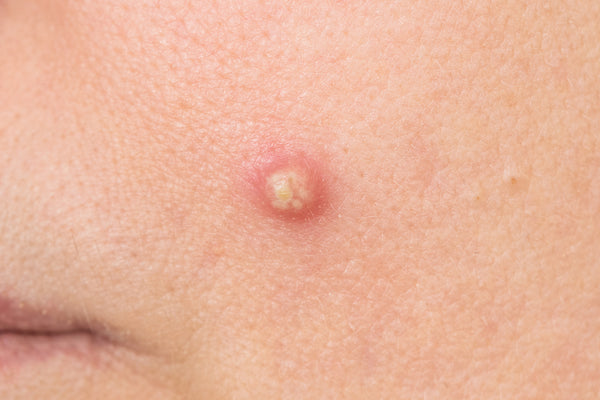Let’s get one thing straight: breaking out is normal! There are 6 main types of zits (listed here in ascending order of severity), and identifying the type you have can help you treat it correctly! Let’s talk about it.
whiteheads
These occur when a layer of skin forms over a pore clogged with sebum and dead skin cells! The pore is clogged all the way through, with a small white head surrounded by red. White heads are *very* common in skin that produces a lot of oil, or in particularly oil-prone areas like the t-zone.

Whiteheads are very difficult to remove completely by squeezing, and way more likely to scar if you try!
blackheads
Blackheads are like whiteheads, but the buildup inside the pore is exposed to air and has oxidized, making it appear darker! The skin around the blackhead should appear normal, not inflamed.

To avoid blackheads and whiteheads, we recommend making sure you’re cleansing really well and exfoliating a few times a week. Clay masks can also be helpful for drawing the gunk out of a blackhead.
papules
Papules are small, hard, inflamed-looking raised bumps in the skin. They’re tender to the touch and usually pink or red. Papules do *not* form a head, and they have no visible center or pus.

Papules occur when a whitehead or blackhead becomes so irritated that it damages the skin around it and causes inflammation. You can usually treat papules with ingredients like salicylic acid!
pustules
These are your stereotypical pimples: inflamed and full of pus! They appear as a red bump that has come to a white or yellow pus-filled head on top. Pustules pop fairly easily and aren’t likely to scar; however, popping CAN cause the bacteria to spread, so we don’t recommend it.

Pustules are also usually treatable with topical acne-fighting ingredients like salicylic acid.
nodules
Nodules are hard bumps, very deep in the skin; they’re typically much deeper in the skin than any of the other types of acne we’ve discussed here! They are the result of an infection deep within your pore.

Nodules never form a head but are very painful and inflamed. They are unfortunately very likely to cause dark spots and scarring!
cysts
Often caused by hormones, cysts take the form of large, soft, painful bumps very deep in the skin.

Cysts are filled with pus and can burst easily; when that happens, the surrounding skin can get infected too! They sometimes feel itchy, and are very likely to cause scarring.
treatment
Whiteheads, blackheads, papules, and pustules are all treatable with topical acne-fighting ingredients like salicylic acid! Might we suggest our new probiotic acne serum, which features 1.5% salicylic acid?
As for nodules and cysts - unfortunately, these can take weeks to go away on their own, and can’t really be treated at home! These are best treated with the help of a dermatologist.
the routine
Here’s a simple daily routine we recommend for skin that’s prone to acne.
step 1: cleanse
Cleansing deeply to remove makeup, dirt, excess oil, etc. is paramount to healthy, happy skin! We recommend choosing a gentle product like our oil to milk cleanser, which cleans your skin without stripping it or drying it out.
step 2: tone
Toning acts as a second cleansing step and also helps balance your skin’s pH! Our raspberry vinegar toner is great for oily-prone skin; rosewater toner is great if you’re looking for something gentler and less acidic.
Another option: try raspberry vinegar on particularly oily or acne-prone areas, and balancing rosewater everywhere else!
step 3: probiotic acne serum
Our 1.5% salicylic acid serum treats acne, blackheads, AND clogged pores. Here’s how it works: salicylic acid is oil soluble, which allows it to penetrate into pores and unclog them! On the surface, it also helps smooth skin by sloughing away dead cells.
Our formula also nourishes skin with beta-glucan and microbiome-friendly probiotics, so you can avoid the irritation and dryness that usually comes with anti-acne products.
step 4: moisturizer
Don’t believe the rumors - oily and acne-prone skin needs to be moisturized too! Perfect for oily, combination, and blemish-prone skin, our electrolyte water cream is a lightweight moisturizer that provides breathable hydration while calming stressed skin and reducing the look of irritation. This cream leaves your skin soft, plump, and refreshed, with an electrolyte blend that helps balance hydration, calms, and controls shine.
step 5: SPF (AM only)
Protecting your skin with a sunscreen like our daily SPF is crucial to its health; SPF can also help keep post-acne dark spots from getting darker!
We hope you found this helpful! If you have any questions, feel free to shoot us a DM on Instagram or email info@cocokind.com.